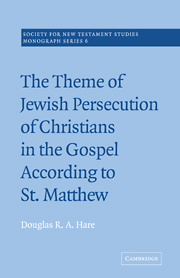In his Evangelium Lucae, Wellhausen translates the Matthean τoú ρó úμv and the Lucan oι ατρ as ‘your ancestors’ and ‘their ancestors’ respectively, but offers no justification for these renderings. E. Lohmeyer, Das Evangelium des Matthäus, second edition edited by W. Schmauch (1958), p. 96, accepts Wellhausen's conjecture (Lohmeyer's transliteration is inaccurate). Black, p. 275, likewise follows Wellhausen, but omits the prefixed Γ. Although the Γ would be required in the Vorlage of Matthew's version (cf. Dan. 7 : 7; Black's omission of the Γ here is inexplicable), Wellhausen's is impossible as the subject of the clause in Luke's Vorlage; G. Dalman, Grammatik desjüdisch-palästinischen Aramäisch, second edition (Leipzig: J. C. Heinrichs'sche Buchhandlung, 1905), p. 117, cites examples in which Γ is used determinatively, but gives no instance in which Γ with a substantive functions as the subject of a clause without any antecedent. Black, omitting the Γ, apparently takes as the adjective with 3 m. pi. suffix; cf. M. Jastrow, A Dictionary of the Targumim, the Talmud Babli and Yerushalmi, and the Midrashic Literature (New York/Berlin, Verlag Choreb, and London: Shapiro, Vallentine and Company, 1926), p. 1317. This could be translated ‘their ancestors’, or, in Greek, oι ατρσ αúτv. Although it is very unusual for the subject to follow the object in Semitic syntax, it is not impossible for the Lucan Vorlage proposed by Black to be taken in this way.
